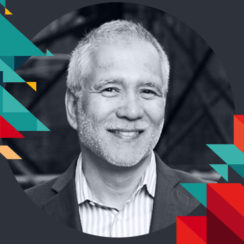With his three decades of enterprise technology experience, Carlos Dominguez brings a unique perspective to this month’s discussion in the Executive Circle roundtable series. Carlos chose to provide his perspective not just on leadership, but how leadership principles are impacted by the constant state of change resulting from the technological advances driving the 21st century. Carlos focused on what’s happening in leadership through the lens of his strategic direction for sprinklr, considered a “foundational customer experience platform for brands,” by Forrester Research, and his previous 22-year career at Cisco systems.
Carlos started by clearly stating what probably many of us are experiencing: That we all feel a certain level of being overwhelmed by the amount of change that is really transforming all of our businesses. We need to determine how to remain relevant and ahead of this constant state of flux. Carlos broke these transformations into waves that have occurred over the past three decades, starting with the advent of the Internet, continuing through the mobile revolution and now with social networks that Carlos noted are connecting 3 billion people.
Change happens
“There are massive amounts of data produced on a daily basis,” said Carlos. “It may be a product review, it may be a tweet asking for help from a company, but there are incredible contributions happening. What we all need to recognize is that all of this content was not invented for marketing or customer care. It was invented for human beings to interact with each other. For the first time, leaders have the ability to interact with our clients or prospective clients in a way where we know them better than we ever have in the past.”
Carlos shed light on a basic truth: that we’re all being disrupted. Companies are failing if the window is too long between when a new trend emerges and when that company adapts to the change. He stated that the reason for failure is that this window is when the company has its maximum exposure to competitive threats.
“If you don’t adapt to change, somebody else is going to basically Uber you or they’re going to Amazon you or they’re going to approach you with an Airbnb model,” said Carlos. “They’re going to attack you from a very, very different point of view. This makes understanding and developing a strategy for digital transformation an imperative. You need to monitor, manage and deliver amazing customer experiences when dealing with a multitude of channels.”
Experience and its impact on innovation
Carlos highlighted that one critical consideration in the ability of a business to adapt to change is for its leaders to not rely heavily on their past experiences when making decisions for today and for the future. “What keeps me up at night is that my 45 years of experience in the consumer-packaged-goods industry will make me see the new problems of the new world in an old way,” shared Carlos. “We must have the courage and the confidence to accept the fact that we don’t know it all, especially in today’s world. All the rules have been rewritten and we shouldn’t be embarrassed by this. We need to be open to bringing other people into our thoughts, decisions, and conversations. This will help to make sure that we’re looking at a problem through the right lens. The ability to adapt, to constantly evolve and to overcome the fear of remaining or becoming obsolete are all critical qualities I think are imperative in today’s world.”
Stay tuned for our next Executive Circle edition with Rick Keyes, President & CEO Meijer, Inc.

